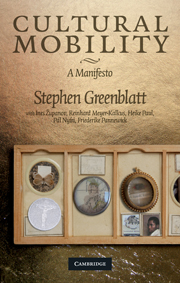Book contents
- Frontmatter
- Contents
- List of authors
- List of illustrations
- Acknowledgments
- 1 Cultural mobility: an introduction
- 2 “The Wheel of Torments”: mobility and redemption in Portuguese colonial India (sixteenth century)
- 3 Theatrical mobility
- 4 World literature beyond Goethe
- 5 Cultural mobility between Boston and Berlin: how Germans have read and reread narratives of American slavery
- 6 Struggling for mobility: migration, tourism, and cultural authority in contemporary China
- 7 Performativity and mobility: Middle Eastern traditions on the move
- 8 A mobility studies manifesto
- Index
2 - “The Wheel of Torments”: mobility and redemption in Portuguese colonial India (sixteenth century)
Published online by Cambridge University Press: 05 June 2012
- Frontmatter
- Contents
- List of authors
- List of illustrations
- Acknowledgments
- 1 Cultural mobility: an introduction
- 2 “The Wheel of Torments”: mobility and redemption in Portuguese colonial India (sixteenth century)
- 3 Theatrical mobility
- 4 World literature beyond Goethe
- 5 Cultural mobility between Boston and Berlin: how Germans have read and reread narratives of American slavery
- 6 Struggling for mobility: migration, tourism, and cultural authority in contemporary China
- 7 Performativity and mobility: Middle Eastern traditions on the move
- 8 A mobility studies manifesto
- Index
Summary
Garcia da Orta wrote in his Colóquios dos Simples e Drogas he Cousas Medicinais da India that “the Portuguese who sail through many parts of the world, wherever they go do not look for knowledge but only how to dispose of their merchandise … They are not curious to know about things that exist in those countries.” In 1563, when the book was printed in Goa, the capital of the Portuguese colonial empire in Asia, trade and profit-making were routinely branded as sinful from the pulpits and as unlawful when taxes and bribes were not paid to the royal officials. A sense of decay, decadence, and loss of spiritual and moral nerve was pervasive in contemporary Portuguese correspondence and in the treatises reflecting on the Estado da Índia that stretched along the coasts of the southern seas from Africa to Asia. Fifty years after the successful military conquest of Goa in 1510 and the self-declared possession of the oriental “Indias,” those first two decades appeared to the late sixteenth-century Portuguese in India as a “golden” age, idade dourada, after which everything went downhill. Though the accumulation and consumption of goods, riches, and capital had created euphoria and fantastic mercantile élan, they also provoked anxiety and profound soul searching. Complaints about the economic and moral crisis that started in that period may have been widely exaggerated, but these complaints engendered a new genre of colonial writing and historiography that focused specifically on the decadência of the Portuguese empire.
- Type
- Chapter
- Information
- Cultural MobilityA Manifesto, pp. 24 - 74Publisher: Cambridge University PressPrint publication year: 2009



